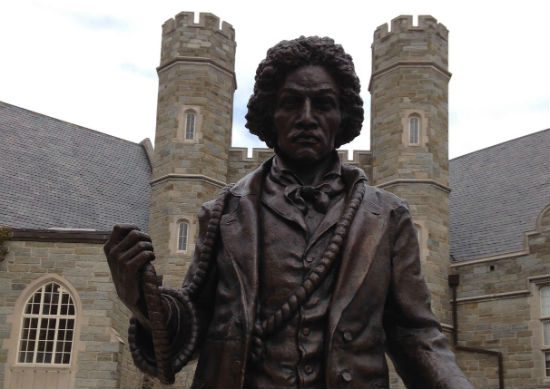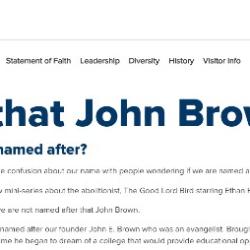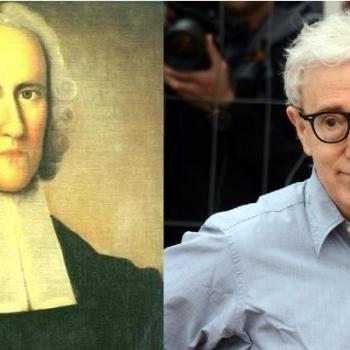“Philadelphia has more than 1,700 statues on public land, which is more than any other city. … None of these statues are about named or individual African Americans. None.”
My older daughter — who just earned her history degree from Temple — was talking about this just a few weeks ago. It’s inexcusable and so unlikely that it would be bewildering if not for the fact that everybody knows how and why it’s true. Why isn’t there a statue honoring Marian Anderson? Or Frances Harper? Or Oney Judge (she wasn’t from Philly, but this is where she escaped from)? Or Cecil B. Moore? Or Richard Allen? Heck, why not Dick Allen? Or even Will Smith?
There is a statue of Richard Allen at Mother Bethel, but that’s on private property. Philly athletic greats Dr. J., Wilt Chamberlain and Joe Frazier are all also commemorated with statues on private property. And there are a handful of statues honoring unnamed black Philadelphians, like the generic Philly Stars ballplayer at Memorial Park. But, as Murray Dubin says in the quote there at the top, no statues of “named or individual African Americans” on public land.

That quote is from an Inquirer article a few weeks ago previewing the unveiling this month of the first exception to that in the 335-year history of the city: “Philly’s first public sculpture honoring an individual African American will be unveiled next month” (via John Fea). The statue honors “educator, activist, and ballplayer Octavius V. Catto.”
I did not know any of this man’s story. He was an amazing person — a Renaissance man at a time when his country was scarcely willing to acknowledge his humanity. Catto (1839-1871) was an ordained Presbyterian minister. He assisted Frederick Douglass’ efforts to recruit black soldiers for the Civil War. After the war, he fought to ensure the ratification — and the reality — of the 15th Amendment in Pennsylvania. Catto used civil disobedience tactics to desegregate Philly’s public street cars in 1867. He also became the first black person to join Philadelphia’s Franklin Institute.
And wait … what was that bit about him being a “ballplayer”? Catto organized, captained, and played second base for the Philadelphia Pythians — one of the earliest base ball teams in the area, back in the days when that was still two words. In 1869, the Pythians took on the Philadelphia Olympians, the dominant white team of that time, with a history predating Cooperstown and the Knickerbockers. It was probably the first interracial baseball game. The Pythians lost, respectably, 44-23 (almost a pitcher’s duel for the time, when the still-evolving game was gloveless, underhand, and a bit closer to cricket).
I’m not sure if that game was played at the Pythians’ home field in Fairmount Park or in Camden, N.J., where the Olympians often played.* Either way, there ought to be a plaque or a historical marker or something to note the event.
By the age of 32, Octavius Catto had become a prominent figure in Philadelphia politics. By helping to secure the right to vote for black Philadelphians, and helping to organize voters, he had made the black vote a key factor that could sway the mayoral election of 1871. That made him a recognizable target for white politicians and their violent goons.
Catto was murdered on Election Day, 1871, shot in the back by the coward Frank Kelly:
The weeks before the mayoral election of 1871, which pitted Republican City Council president William Stokley against Democrat James Biddle, were marked by unrest between Philly’s black residents and the Irish. On the night before the election, a black stevedore was shot to death in the street; another man, a laborer named Moses Wright, was wounded and died three weeks later. On Election Day, October 10th, Catto, then age 32, voted, went to the I.C.Y. and sent its teachers and students home because of the danger, warned fellow members of the Fifth Brigade of the Pennsylvania National Guard that they might be called on to quiet the streets, then walked home to get his uniform. Two doors away from his house, he passed a man who then turned and shot him in the back. The bullet went through his heart. Stokley won the election. One of the Squire’s [political boss William McMullen’s] operatives, a thug named Frank Kelly, was tried for Catto’s murder after five years on the lam. He was acquitted in 1877, by what was likely an all-white jury.
The statue of Catto, by sculptor Branly Cadet, will be unveiled this month on the southwest apron of City Hall.
– – – – – – – – – – – –
* Camden was also home, at the time, to noted baseball fan Walt Whitman. The Whitman quote in Bull Durham — “I see great things in baseball. It’s our game, the American game. It will repair our losses and be a blessing to us” — is likely a paraphrase of something he said in an 1888 interview in Camden, where he probably cheered at games played by the Olympians. (The long-time president of that club, by the way, was a man named William Whitman. I don’t know if that’s a coincidence or a connection.)












